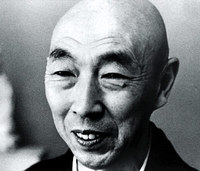Kosho Uchiyama
Born
Tokyo, Japan
Died
March 13, 1998
Genre
More books by Kosho Uchiyama…
“Shohaku Okumura ~ We cannot expect any ecstasy greater than right here, right now—our everyday lives.”
― Zen Teaching of Homeless Kodo
― Zen Teaching of Homeless Kodo
“KODO SAWAKI ~ To practice the buddha way is not to let our minds wander but to become one with what we’re doing. This is called zanmai (or samadhi) and shikan (or “just doing”). Eating rice isn’t preparation for shitting; shitting isn’t preparation for making manure. And yet these days people think that high school is preparation for college and college is preparation for a good job.”
― Zen Teaching of Homeless Kodo
― Zen Teaching of Homeless Kodo
“SHOHAKU OKUMURA: We human beings have the ability to think of things not in front of us. We create stories in our minds in which the hero or heroine is always us. We evaluate what happened in the past, we analyze our present conditions, and we anticipate what should happen in the future. This is an important ability. Because of it, we can create art, study history, and have visions of the future. Without it, we couldn’t write or enjoy poems or movies. Almost all of human culture depends on seeing things not in front of our eyes. This means almost all culture is fictitious. Our ability to create such fictions is the reality of our lives. We cannot live without it. But this ability leads to many problems. We have certain expectations of our stories. If things go as we expect, we feel like heavenly beings, but if not, we feel we’re in hell. Often we desire more and more without ever experiencing satisfaction, like hungry ghosts. It’s important to see that it’s not life that causes suffering but our expectation that life should be the way we want. We can’t live without expectation, but if we can handle the feelings caused by the difference between our expectations and reality, that’s liberation. Zazen practice as taught by Dogen Zenji, Sawaki Roshi, and Uchiyama Roshi is taking a break from watching the screen of our stories and sitting down on the ground of the reality that exists before our imagination. When we’re not taken in by our fictitious world, we can enjoy and learn from the stories we make.”
― Zen Teaching of Homeless Kodo
― Zen Teaching of Homeless Kodo








































